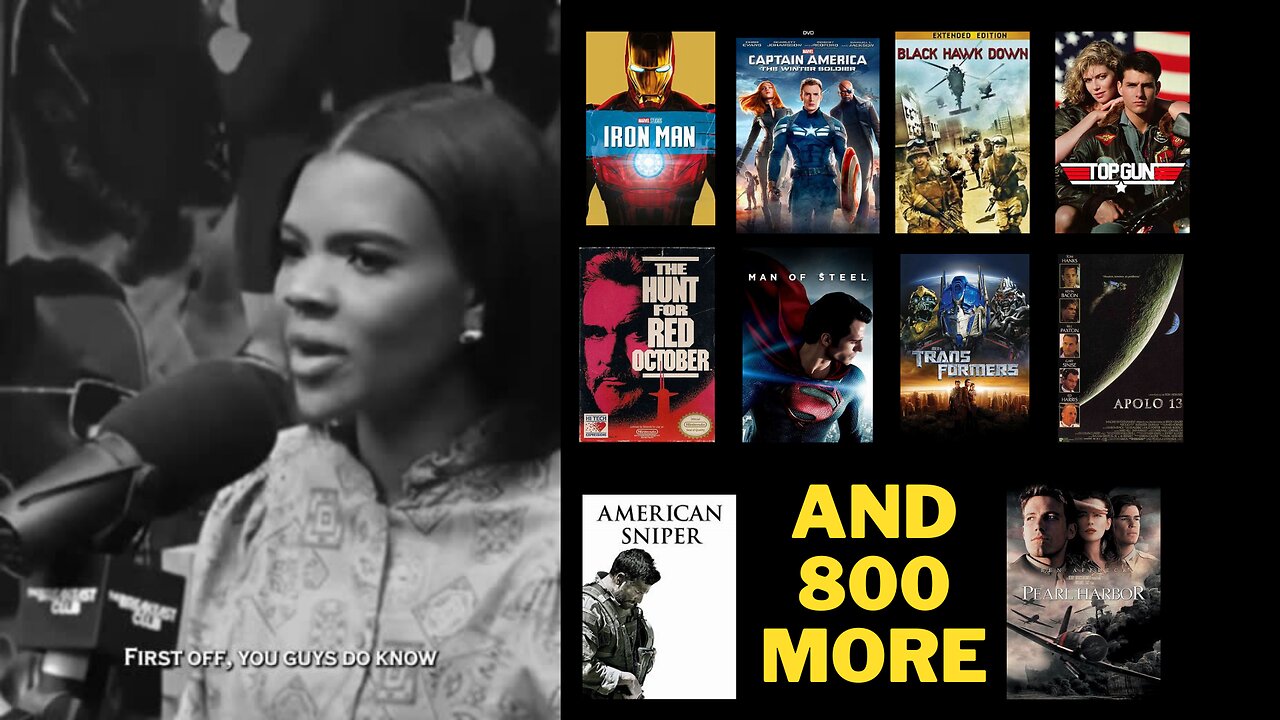Premium Only Content

The History of Pentagon Funding in Hollywood's Film Industry
The History of Pentagon Funding in Hollywood's Film Industry
The Pentagon has played a significant role in Hollywood's film industry for many years, financing and supporting over 800 movies. This relationship between the U.S. Department of Defense (DoD) and Hollywood is rooted in mutual benefits, where filmmakers gain access to military resources, and the Pentagon gains a platform to promote favorable images of the military. Here's a comprehensive look at how this collaboration has evolved over time:
Early Beginnings
The collaboration between Hollywood and the Pentagon began as early as World War I, but it was during World War II that it became more pronounced. During this time, the U.S. government recognized the power of film as a tool for propaganda and morale-boosting. Movies like "Why We Fight," a series of films created by the Office of War Information and directed by Frank Capra, were instrumental in rallying public support for the war effort.
Post-War Era and Cold War
In the post-war era, the relationship between Hollywood and the Pentagon continued to grow. The Cold War era saw a significant increase in films that depicted the U.S. military in a positive light, often as a means to counter Soviet propaganda. Movies such as "The Longest Day" (1962) and "Patton" (1970) were produced with extensive support from the military, including the provision of equipment, personnel, and technical advice.
The Rise of Blockbusters
The 1980s marked a pivotal decade for Pentagon-Hollywood collaboration with the rise of blockbuster films. One of the most notable examples is "Top Gun" (1986), which received substantial support from the Navy. The film not only boosted recruitment numbers but also portrayed the military in a glamorous and heroic light. This period solidified the formula of using Hollywood movies as a recruitment and public relations tool for the military.
The Modern Era
From the 1990s onwards, the collaboration has only intensified. Films like "Black Hawk Down" (2001), "Transformers" series, and "Iron Man" (2008) benefitted from Pentagon support. The Department of Defense's Entertainment Media Unit oversees these collaborations, ensuring that the military is depicted accurately and favorably. This unit reviews scripts, provides logistical support, and even participates in the production process to varying degrees.
The Scope of Influence
The Pentagon's involvement is not limited to action and war films. It extends to various genres, including science fiction and dramas, whenever the storyline involves military elements. This broad influence helps shape public perception of the military across different audiences and demographics.
Recent Developments
In recent years, there has been growing scrutiny and debate over the extent of Pentagon influence in Hollywood. Critics argue that this collaboration can lead to biased portrayals of the military and suppress critical viewpoints. Documentaries and investigative reports have highlighted instances where scripts were altered or productions were modified to align with military interests.
Impact and Criticism
The impact of Pentagon funding on Hollywood is multifaceted. On one hand, it provides filmmakers with the resources needed to create realistic and high-quality productions. On the other hand, it raises ethical concerns about artistic freedom and the potential for propaganda. As the media landscape evolves, this relationship continues to be a topic of discussion and analysis.
Conclusion
The Pentagon's funding and support of Hollywood's film industry have shaped countless movies over the decades, fostering a complex relationship that intertwines national security interests with entertainment. This collaboration has not only influenced how the military is portrayed on screen but also how the public perceives it, making it a powerful tool for both the Pentagon and Hollywood.
By understanding this history, viewers can better appreciate the nuances of military-themed films and the broader implications of this unique partnership.
-
 2:46
2:46
Money, Motivation and Store
11 months agoBIG NEWS!! Dan Bilzerian Goes All In on Israel and Is No Longer Afraid to Speak the Truth
2714 -
 1:09:08
1:09:08
Jeff Ahern
1 hour agoThe Sunday show!
1.02K1 -
 LIVE
LIVE
LumpyPotatoX2
5 hours agoStarfield w/MODs | Sub-Sunday - #RumbleGaming
1,788 watching -
 LIVE
LIVE
GritsGG
2 hours agoWin Streaking All Day! Most Wins 3230+ 🧠
132 watching -
 7:51
7:51
scoutthedoggie
4 hours agoAirsoft War Scotland - The Stargate Attack
8.48K2 -
 16:09
16:09
Silver Dragons
1 day agoThese BROKEN Silver & Gold Coins BLEW ME AWAY - CSOA EP. 1
8.28K8 -
 11:25
11:25
Damon Imani
1 day ago11 Minutes of Damon DESTROYING The View Hosts | Compilation Vol.15
8.25K6 -
 LIVE
LIVE
FusedAegisTV
16 hours agoOFFICIAL Evo 2025 Day 3 Co-Stream - Las Vegas, NV ∥ Top 8 FINALS! SF6, Tekken 8 & MORE
832 watching -
 LIVE
LIVE
itsReel
3 hours agoHAPPY SUNDAY! Picture Perfect, Then Tigger Happy!
81 watching -
 17:28
17:28
Degenerate Jay
3 days ago $0.30 earnedDoes Batman: Arkham Asylum Need A Remake?
7.28K